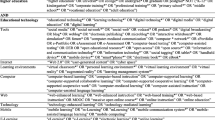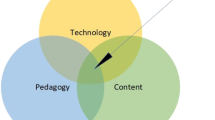Abstract
This study employs an Afro-centric framework of Digital Unhu (i.e. digital humanism) and netnographic accounts of supervisor-supervisee interactions to investigate Mobile Instant Messaging mediated interaction as a platform for honing students’ career management competencies. While many existing studies foreground Western epistemological lenses that have limited resonance with resource-constrained African contexts, the Afro-centric Digital Unhu framework enabled a more nuanced delineation of student-supervisor interaction as it was enacted in a South African university setting. Findings demonstrated that WhatsApp-mediated interaction, framed within the African ethos of Digital Unhu, provided a dynamic and highly personal environment in which the supervisor could delicately coach students in various career related processes, namely, the negotiation of competing family and job hunt commitments, career planning, job applications and salary negotiations, resignations, and managing career frustrations. More broadly, the study demonstrates the central role of Unhu in negotiating student-supervisor interactions in the unique cultural setting, in tension to a degree with the Western philosophical thinking in which South African higher education is situated. Further, contrary to common characterisations of texting culture as a youth phenomenon, both student and supervisor were able to leverage WhatsApp to achieve career management ends.























Similar content being viewed by others
Data availability
All data generated or analysed during this study are included in this published article [and its supplementary information files].
References
Alebaikan, R., Bain, Y., & Cornelius, S. (2023). Experiences of distance doctoral supervision in cross-cultural teams. Teaching in Higher Education, 28(1), 17–34. https://doi.org/10.1080/13562517.2020.1767057
Ali, H. I. H., Al-Saadi, Z., & Scatolini, S. S. (2022). Conceptualizing graduates attributes (GAs) in English language teacher education programs in Oman during the COVID-19 pandemic. SAGE Open, 12(3), 1–15 21582440221113831.
Anchimbe, E. A. (2011). On not calling people by their names: Pragmatic undertones of sociocultural relationships in a postcolony. Journal of Pragmatics, 43(6), 1472–1483.
Arifin, B., Saputra, S. Y., Muzakki, A., Setiawan, E., & Jumareng, H. (2022). Increase students’ self-confidence and reduce anxiety during Covid-19: Is coping strategy becomes the solution? Jurnal Obsesi: Jurnal Pendidikan Anak Usia Dini, 6(5), 4171–4180.
Asgharzadeh, A. (2008). The return of the subaltern: International education and politics of voice. Journal of Studies in International Education, 12(4), 334–363.
Australian Blueprint for Career Management (2010). Eleven career management competencies. Ministerial Council for Education, Early Childhood Development and Youth Affairs in collaboration with the Australian Government’s Department of Education, Employment and Work Place Relations.
Ayranci, E., & Oge, E. (2011). A study of the relationship between students' views toward a career management class and their future careers. International Business Research, 4(1), 198–207.
Björk, P., & Kauppinen-Räisänen, H. (2012). A netnographic examination of travelers' online discussions of risks. Tourism Management Perspectives, 2(3), 65–71.
Bolden & Kirk. (2009). African leadership surfacing new understandings through leadership development. International Journal of Cross Cultural Management, 9(1), 69–86.
Chartered Institute of Personnel and Development. (2013). Improving social mobility inside the HR profession and beyond - survey report, may 2013. The Broadway.
Creswell, J. W. (2012). Educational research: Planning, conducting and evaluating quantitative and qualitative research. Pearson.
Giddy, P. (2012). “Philosophy for children” in Africa: Developing a framework. South African Journal of Education, 32, 15–25.
de Kadt, E. (1998). The concept of face and its applicability to the Zulu language. Journal of Pragmatics, 29(2), 173–191.
Forster, D. A. (2010). African relational ontology, individual identity, and Christian theology. Theology, 113(874), 243–253.
Githaiga, J. N., Späth, C., Sicwebu, N., Perera, S., Tolla, T., & Leon, N. (2023). Critical reflections on conducting qualitative Health Research during COVID-19: The lived experiences of a cohort of postgraduate students in a south African University. International Journal of Qualitative Methods, 22. https://doi.org/10.1177/16094069221148406
Greyling, J., Koorsse, M., Ngundu, T., & Kyazze, M. (2013). Mobile instant messaging (MIM) applications to assist learning in South Africa. Educational Research for Social Change, 2(1), 30–47.
Hooley, T., Shepherd, C., & Dodd, V. (2015). Get yourself connected: Conceptualising the role of digital technologies in Norwegian career guidance. International Centre for Guidance Studies, University of Derby.
Hovey, R. (2004). Critical pedagogy and international studies: Reconstructing knowledge through dialogue with the subaltern. International Relations, 18(2), 241–254.
Hunter, M. (2011). Beneath the “Zunami”: Jacob Zuma and the gendered politics of social reproduction in South Africa. Antipode, 43(4), 1102–1126.
Jackson, D. (2014). Employability skill development in work-integrated learning: Barriers and best practice. Studies in Higher Education, 40(2), 350–367.
Jackson, D., & Wilton, N. (2016). Developing career management competencies among undergraduates and the role of work-integrated learning. Teaching in Higher Education, 21(Iss 3), 266–286.
Kaliisa, R., Palmer, E., & Miller, J. (2019). Mobile learning in higher education: A comparative analysis of developed and developing country contexts. British Journal of Educational Technology, 50(2), 546–561.
Kimmons, R., & Veletsianos, G. (2014). The fragmented educator 2.0: Social networking sites, acceptable identity fragments, and the identity constellation. Computers and Education, 72, 292–301.
Kozinets, R. V. (2015). Netnography: Redefined. SAGE.
Kucukgencay, N., & Peker, B. (2023). The solo pantomime in the pandemic: Distance postgraduate education in the department of mathematics education during COVID-19. International Electronic Journal of Mathematics Education, 18(1), em0725. https://doi.org/10.29333/iejme/12716
Lauricellaa, S. & Kay, R. (2013). Exploring the use of text and instant messaging in higher education classrooms. Research in Learning Technology (ALT), 21, 1-17. https://journal.alt.ac.uk/index.php/rlt/article/view/1345/html
Mandeno, P., & Baxter, W. L. (2022). Six principles for the design of better networking events. Business Horizons, 65(4), 493–503.
Mbiti, J. (1970). African religions and philosophies. Doubleday and Company.
McCarthy, M. (1999). Ubuntu: A metaphor for the origins, role and development of the international society for music education. International Journal of Music Education, 33(1), 46–56.
McClune, C. (2017). Digital Unhu: Mobile connectivity and immaterial labour in Zimbabwean artistic expression. New Media & Society, 13(3), Retrieved 17 April 2018 from http://journals.sagepub.com/doi/abs/10.1177/1461444817691511
Msafiri. (2008). Stray thoughts. Information Development, 24(2), 176. Retrieved 6 August 2011 from http://journals.sagepub.com/doi/abs/10.1177/0266666908091133
Neary, S., Dodd, V., & Hooley, T. (2016). Understanding career management skills: Findings from the first phase of the CMS leader project. International Centre for Guidance Studies, University of Derby.
Nicola-Richmond, K., Richards, K., & Britt, K. (2015). The impact of an authentic, simulated learning activity on student preparedness for work-integrated learning. Asia-Pacific Journal of Cooperative Education, 16(4), 343–354.
Olinger, H. N., Britz, J. J., & Olivier, M. S. (2007). Western privacy and/or Ubuntu? Some critical comments on the influences in the forthcoming data privacy bill in South Africa. The International Information & Library Review, 39(1), 31–43.
Outwater, A., Abrahams, N., & Campbell, J. C. (2005). Women in South Africa. Journal of Black Studies, 35(4), 135–154.
Pattman, R. (2010). Investigating “race” and social cohesion at the University of Kwa-Zulu Natal. South African Journal of Higher Education, 24(6), 953–971.
Puncreobutr, V., Malee, & Somjate, M. (2016). Linking work integrated learning and competency of graduates pursuing graduate diploma in teaching profession. Journal of Education and Practice, 7(10), 121–127.
Qiao, Y., Tang, Y., & Hew, K. F. (2018). Student cognitive presence in small group collaboration facilitated by Mobile instant messaging. International Journal of Educational Technology and Learning, 2(1), 14–24.
Salm, T., Johner, R., & Luhanga, F. (2016). Determining student competency in field placements: An emerging theoretical model. The Canadian Journal for the Scholarship of Teaching and Learning, 7(1), 1–18.
Skills Development Scotland (SDS). (2012). Careers management skills framework for Scotland. Skills Development Scotland, Scotland.
Tomaselli, K. G. (2009). (Afri)ethics, communitarianism and libertarianism. International Communication Gazette, 71(7), 577–594.
Tutu, D. (2004). God has a dream: A vision of hope for our time (p. 2004). Doubleday.
Veluchamy, R., Priyam, P., Raja, L., & Rajeswari, S. K. (2016). Using WhatsApp to manage talents in creating student superstars students’ talent management. International Journal of Control Theory and Applications, 9(37), 713–718.
Zembylas, M. (2015). ‘Pedagogy of discomfort’ and its ethical implications: The tensions of ethical violence in social justice education. Ethics and Education, 10(2), 163–174.
Zembylas, M., & Vrasidas, C. (2005). Globalization, information and communication technologies, and the prospect of a ‘global village’: Promises of inclusion or electronic colonization? Journal of Curriculum Studies, 37(1), 65–83.
Zulu, N. (2012). Hlonipha among the Nguni does not tarnish women’s image: a reply to CD Ntuli in A. Nyamende (Ed.) Retrieved 10 May 2020 from http://www.oulitnet.co.za/isikhundla/08clan.asp
Author information
Authors and Affiliations
Corresponding author
Ethics declarations
Conflict of interest
None.
Additional information
Publisher’s note
Springer Nature remains neutral with regard to jurisdictional claims in published maps and institutional affiliations.
Rights and permissions
Springer Nature or its licensor (e.g. a society or other partner) holds exclusive rights to this article under a publishing agreement with the author(s) or other rightsholder(s); author self-archiving of the accepted manuscript version of this article is solely governed by the terms of such publishing agreement and applicable law.
About this article
Cite this article
Rambe, P., Mkono, M. & Meda, L. WhatsApp adoption for the honing of university students’ career management competencies: A netnograghic approach. Educ Inf Technol 29, 2645–2677 (2024). https://doi.org/10.1007/s10639-023-11922-2
Received:
Accepted:
Published:
Issue Date:
DOI: https://doi.org/10.1007/s10639-023-11922-2




